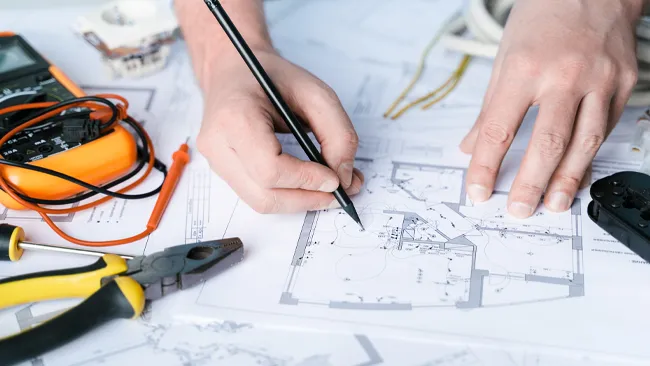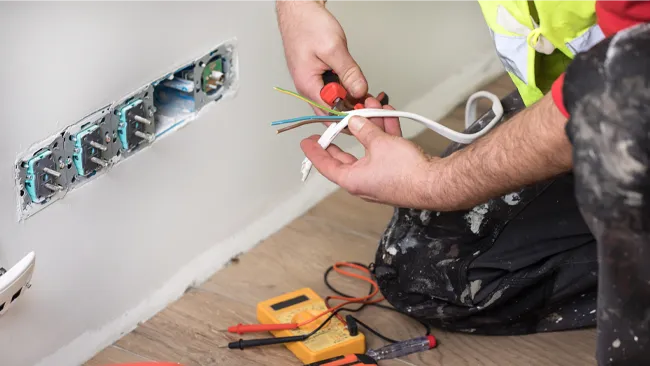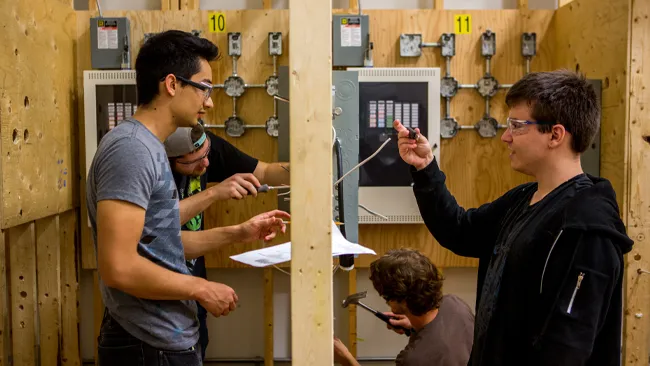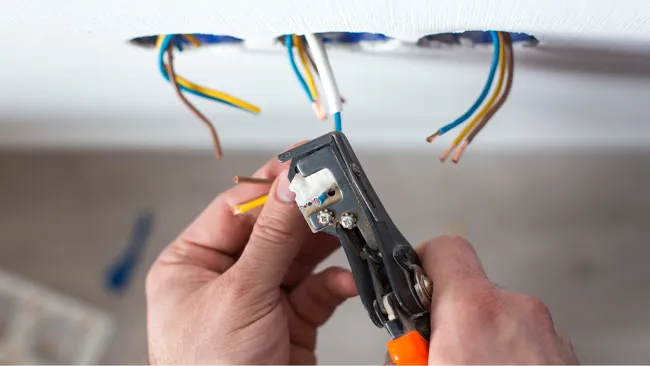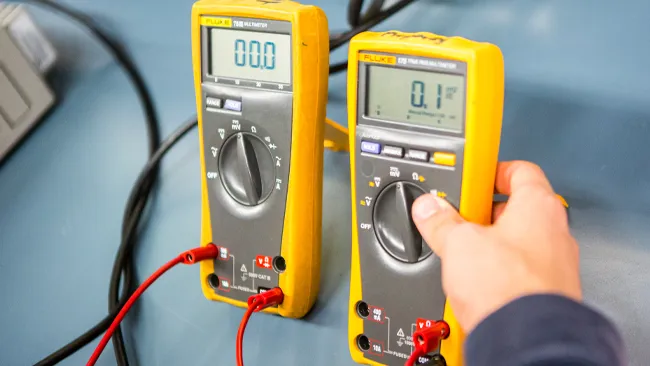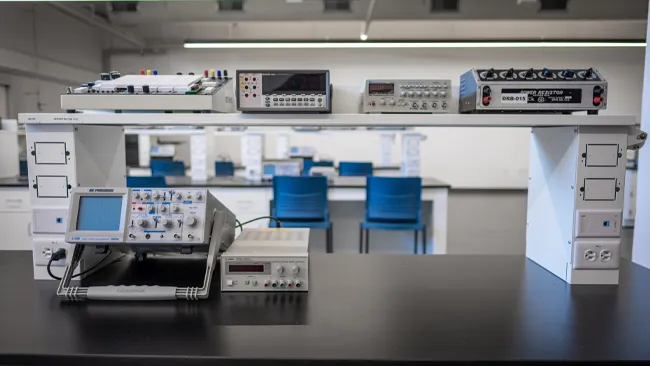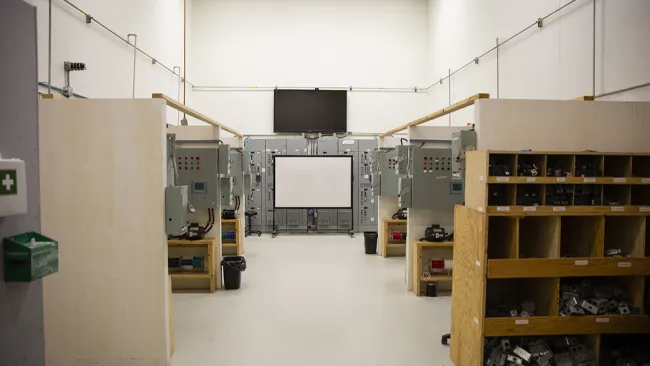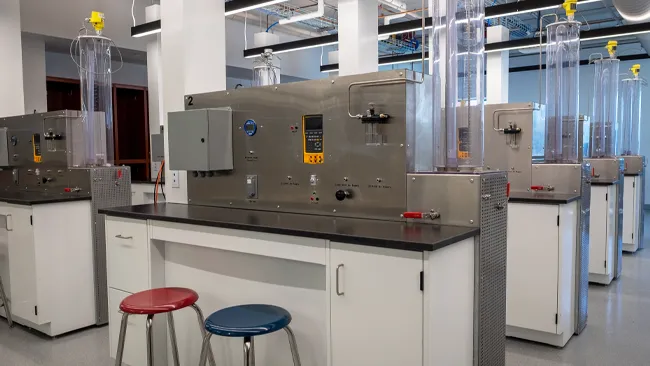Electricians in Construction and Maintenance are skilled professionals who work with electrical systems in buildings and facilities. They make sure electricity is safely and efficiently delivered to power things like lights, heating, communication systems, and even renewable energy technologies. You will typically find electricians working in Homes, Businesses (commercial), Schools, Hospitals, Factories and Plants.
Lambton College offers the in-school portion of the curriculum set out by Skilled Trades Ontario.

Training
The Electrician apprenticeship program consists of on-the-job and in-school training. The program typically takes five years to complete and consists of:
- 8,160 hours of on-the-job training and work experience
- 840 hours of in-school training
Red Seal Exam
At the completion of the in-school portion of the apprenticeship, graduates are given a week of preparation before they write the Red Seal exam for the trade.
Our students may write this exam at the College at the end of the training, or book a separate time to write the exam at the MLTSD office.
What does an Electrician do?
Admission Requirements
To be eligible for this program, applicants must:
- Have a sponsor or employer and must be registered through Skilled Trades Ontario.
- Have a minimum Grade 12 high school education or equivalent
- Be at least 16 years of age
Application Process
This is an apprenticeship program and follows a different application process than regular post-secondary education programs. You cannot apply to this program through ontariocolleges.ca.
Applicants who are registered as an apprentice in a trade should receive a letter from the Ministry of Labour, Training & Skills Development inviting them to apply for schooling. All applications from that point will need their payment processed by the Office of the Registrar & Financial Aid Services at Lambton College.
If you are a registered apprentice and have not received a letter regarding apprenticeship school, please contact your local Ministry of Labour, Training & Skills Development office.
Training Dates
The following training dates are for the 2025-2026 academic year for the Electrician – Construction & Maintenance apprenticeship stream.
- Level 1 (EACS) Dates
- September 2, 2025 - October 31, 2025
- Level 2 (EACS) Dates
- November 10, 2025 - January 23, 2026
- Advanced (CMEA) Dates
- February 2, 2026 - April 17, 2026
Course List
Communication and Documentation
This course prepares apprentices with essential workplace skills, focusing on effective communication techniques (verbal, non-verbal, written) and the use of electronic tools like email, the internet, and computer applications. Apprentices will also learn how to locate, access, and complete industry-specific documentation, such as work orders and timesheets. The course emphasizes personal responsibility, including work ethics, time management, professionalism, and teamwork. It also explores strategies for skill development through mentorship and addresses different learning preferences and needs. Essential skills like reading, writing, numeracy, and digital literacy are covered to support ongoing professional growth.
Introduction to Canadian Electrical Code
This course teaches apprentices how to navigate and apply the Canadian Electrical Code (CEC) Part 1 by covering key terminology, structure, and rule interpretation. Students will learn to understand the objectives and scope of the CEC, how it relates to other regulations like building codes. The course also focuses on rule interpretation, teaching apprentices how to analyze and apply CEC rules related to conductors, raceways, enclosures, and equipment in dwelling units. Practical applications include performing calculations for ampacity, raceway fill, service equipment sizing, the service requirements for a residential occupancy and ensuring compliance with grounding, bonding, and safety regulations. Also covered is class 1 and 2 circuits, pools, tubs and spas, and temporary installations.
Trade Practices
Upon successful completion, the apprentice is able to summarize trade specific practices related to safety requirements and the use of tools and equipment. Note: The expectation for this reportable subject is that apprentices gain an awareness of safe work practices and jobsite hazards. It is not intended to provide apprentices with the related health and safety certifications.
Installation and Maintenance Methods
Upon successful completion, the apprentice is able to demonstrate the installation and maintenance of single-phase service, distribution and branch circuit equipment as well as develop electrical schematics.
Electrical Fundamentals
This course introduces foundational electrical theory and practical skills essential for apprentices. Learners will explore electrical fundamentals, including formulations, algebraic principles, and atomic theory as it relates to electricity. Key topics include the conduction of electricity, common sources such as batteries and solar power, and the characteristics of resistors, with a focus on color coding and properties. Students will develop a comprehensive understanding of basic electrical circuits, applying Ohm's and Kirchhoff's laws to series, parallel, and combination DC circuits. Practical skills are emphasized through hands-on activities, including circuit building and the use of multi-meters to measure voltage, resistance, and current. Additionally, the course covers power, energy, and efficiency in various electrical circuits, providing students with the knowledge to calculate and analyze electrical parameters for real-world applications.
Drawings, Specifications and Standards Fundamentals
Upon successful completion, the apprentice is able to interpret and use information provided from drawings, specifications and standards for electrical installation and maintenance (single-phase). The apprentice is also able to create drawings and schedules
Electrical Systems
Electronic Fundamentals
Drawings, Specifications and Standards Intermediate
Upon successful completion, the apprentice is able to navigate, use and apply drawings and specifications, prepare as-built sketches as well as explain the processes to install and maintain electric heating, HVAC systems, luminaires, wiring devices and exit and emergency lighting systems.
Motor Controls and Devices
Upon successful completion, the apprentice is able to demonstrate how to install motor control circuits, starters and controllers, demonstrate the development of ladder diagrams (power and control), demonstrate diagnostic, commissioning and troubleshooting methods for motor control circuits and components as well as explain the installation, connection and maintenance procedures for motor starters.
Communication and Monitoring Systems
Upon successful completion, the apprentice is able to demonstrate the installation, operation, testing, verification and troubleshooting of security and surveillance systems, fire alarm systems and communication systems and their components.
Canadian Electrical Code II
Renewable Energy Generating and Storage Systems
Electrical Theory and Application
PLC Fundamentals
Power Electronics
Drawings, Specifications and Standards Advanced
Introduction to Instrumentation
Canadian Electrical Code III
Building Automation Systems
Professionalism and Ethics
Power Conditioning
Advanced Motors and Generators
High Voltage Service and Operation
Specialty Installations
Canadian Electrical Code IV

This Employment Ontario program is funded in part by the Government of Canada and the Government of Ontario.
Contact Us
Applied Science, Engineering Technology & Trades



